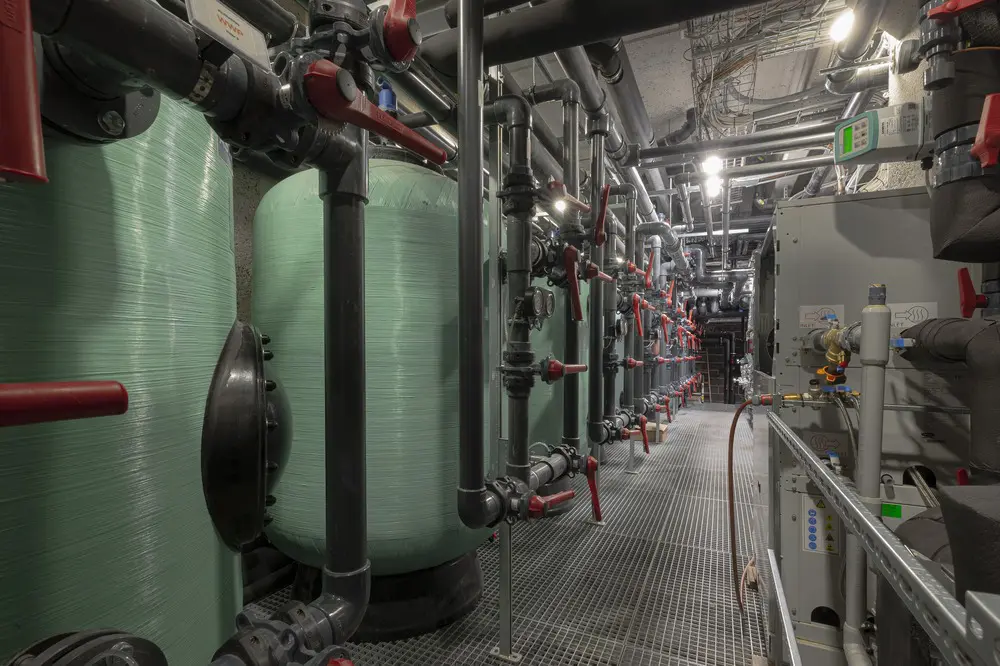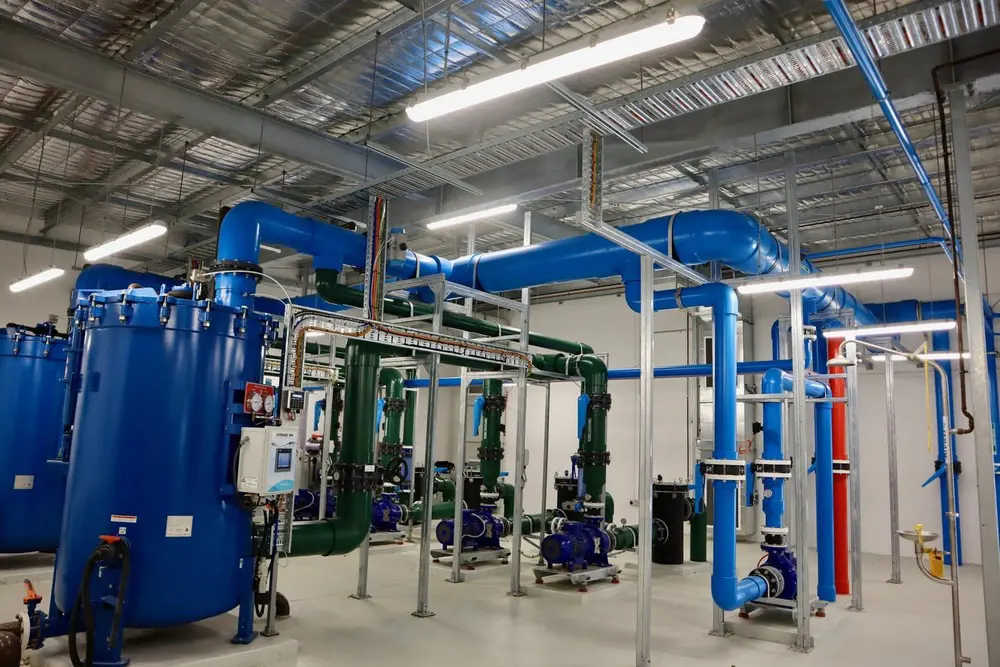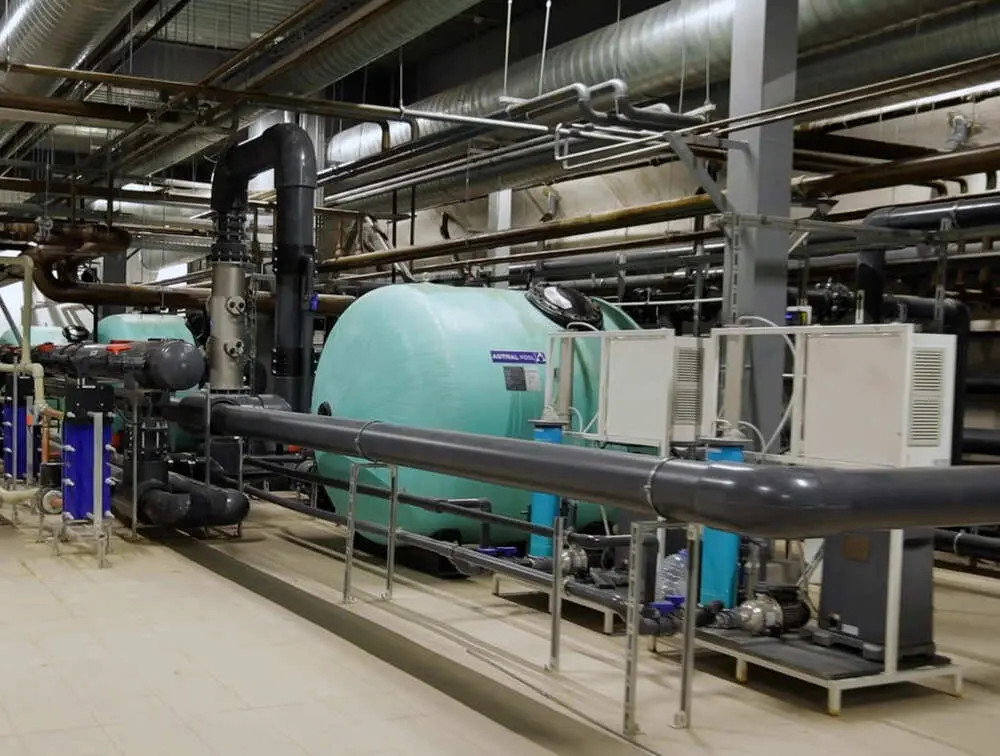Crystal-clear water that beckons you for a swim? A pool that’s truly an oasis, not a breeding ground for bacteria? But before you reach for that chlorine shock, consider this: a top-notch pool filtration system is your first line of defense against cloudy, unhealthy water.
More than just keeping your pool clean, these systems are key to protecting your health and maximizing your enjoyment. A pool filtration system operates similarly to the human body’s kidneys, continuously filtering water to remove debris, dirt, and microorganisms. This process is vital for maintaining water clarity and preventing the proliferation of harmful bacteria and algae.
If you’re in charge of a swimming pool operation, choosing a contractor for your commercial project, or simply need to refresh your memory on these engineering basics, keep reading. We’ll cover how pool filtration systems work, how to choose your system, and how to maintain a filter so that your pool water is pristine, swim after swim.
Dive deeper with the eBook

How does a pool filtration system work?
Maintaining a pristine and inviting pool environment requires an efficient filtration system. This essential component ensures water clarity and hygiene by removing impurities and contaminants. There are several important elements that are involved in the pool filtration operation:
- Pump: At the system’s heart, the pump circulates water through the filtration unit and back into the pool.
- Filter: This component traps and removes particles and contaminants from the water.
- Skimmer: Located at the water’s surface, the skimmer collects floating debris before it sinks.
- Return jets: These outlets return the filtered water to the pool, ensuring even distribution.
The pool filtration system functions in a continuous cycle to ensure optimal water quality. In conjunction with the water treatment system and its disinfection process, they guarantee consistent sanitation, promoting a safe and enjoyable swimming experience. This cleaner water promotes swimmer health by reducing the risk of waterborne illnesses and skin irritations. Efficient filtration also minimizes the need for harsh chemicals, creating a more natural swimming environment.
Beyond immediate benefits, proper filtration extends the life of pool equipment by reducing wear and tear. Advanced systems, like sand filters or regenerative media filters, further contribute to sustainability by conserving water and energy.
For enhanced performance, consider flocculation. This technique uses a specialized product to bind dirt particles together, making them easier for the filtration system or robotic cleaners to remove. This combined approach ensures optimal water quality and minimizes environmental impact.

What different types of pool filters are there?
A robust pool filtration system delivers numerous benefits, starting with crystal-clear water achieved by removing suspended particles. To maximize efficacy, selecting the appropriate filter is crucial for optimal pool maintenance. The main types of pool filters include:
- Sand filters utilize a bed of specially graded sand to trap particles. Water passes through the sand, which captures debris as small as 20-40 microns. Sand filters are known for their durability and ease of maintenance, requiring periodic backwashing to clean the filter media.
- Cartridge filters employ a pleated fabric cartridge to capture contaminants. They are efficient at trapping finer particles (10-15 microns) and are easy to clean by rinsing with a hose. Cartridge filters do not require backwashing, making them more water-efficient.
Although these are the three most common solutions, new innovations are appearing on the market. Fluidra has introduced regenerative filters, a significant advancement in pool filtration technology. These systems use specialized filter media, such as perlite, to capture particulate matter.
The hallmark of regenerative filters is their ability to trap particles using flexible tubes coated with this specialized media. Upon saturation, the filter undergoes a self-regeneration process facilitated by vibration, effectively rejuvenating the filter media. This leads to significant energy and water savings and reduces chemical usage, exemplifying a progressive approach toward pool maintenance and sustainability.

How to choose the right pool filter system
Selecting the ideal filtration system for your pool involves carefully considering several key factors. Firstly, the size of your pool and its anticipated usage plays a significant role. Larger pools or those subject to frequent use require larger pool filtration systems capable of handling higher volumes of water and contaminants.
Secondly, your personal maintenance preferences should be taken into account. If you prefer a low-maintenance option, cartridge filters might be preferable as they only require periodic cleaning. Sand filters, while more effective, demand regular backwashing, which may be a consideration for some pool owners.
Finally, for the environmentally conscious, prioritize systems that promote sustainability. Opt for options that conserve water and energy, minimizing the ecological footprint of your pool maintenance routine.
How to properly maintain your pool filtration system
Optimizing the performance and longevity of your pool filtration system requires a proactive approach to maintenance. A consistent maintenance routine is crucial to ensure the system operates at peak efficiency, effectively removing contaminants and maintaining optimal water quality.
By adhering to recommended maintenance practices, you can prevent costly repairs, and extend the lifespan of your equipment. Let’s explore some essential maintenance tips that will safeguard your investment and maximize the efficiency of your filtration system.
- Clean the filter regularly: Depending on the type of filter, regular cleaning is necessary. For sand filters, backwash periodically to flush out debris. Cartridge filters should be removed and rinsed off with a hose, while DE filters need backwashing and DE powder replenishment.
- Check the pressure gauge: Most filters come with a gauge indicating when the filter needs cleaning. If the pressure reading is above the normal operating range, it’s time to clean or backwash the filter.
- Inspect and maintain the pump: The pump is the heart of your filtration system. Check the pump’s strainer basket frequently and remove any debris. Regularly inspect the pump for leaks or unusual noises, which may indicate the need for repairs or parts replacement.
- Monitor and adjust water chemistry: Maintaining proper water balance (pH, alkalinity, and chlorine levels) helps keep the filter and other equipment free from scale and corrosion, which can impede filtration efficiency.
- Replace filter media as needed: Over time, filter media (sand, cartridges, or DE) becomes less effective at capturing debris. Sand typically needs replacing every 3-5 years, cartridges every 1-2 years, and DE powder after each backwash.
- Keep the pool clean: Regularly skimming the surface , brushing the walls, and vacuuming the pool floor reduces the load on your filter by preventing excess debris from entering the system. This can also extend the time between filter cleanings.
- Winterize the filtration system (if needed): In colder climates, it’s important to winterize your filtration system to prevent damage from freezing. Drain water from the pump, filter, heater, and other equipment, and cover them to protect them from the elements.
It’s not just about the chlorine
An efficient and properly maintained filtration system is paramount to achieving optimal water quality and maximizing the lifespan of any pool. By understanding filtration technology, pool owners and industry professionals can make informed decisions regarding system selection, maintenance, and optimization.
Implementing a comprehensive approach that encompasses regular cleaning, pressure monitoring, water chemistry balancing, and timely media replacement ensures peak operational efficiency. Furthermore, embracing sustainable solutions, such as regenerative filters, contributes to environmentally conscious pool management.
A well-functioning pool filtration system not only enhances the aesthetic appeal of a pool but also safeguards the health and safety of its users, promoting a pristine aquatic environment for recreation and relaxation.
